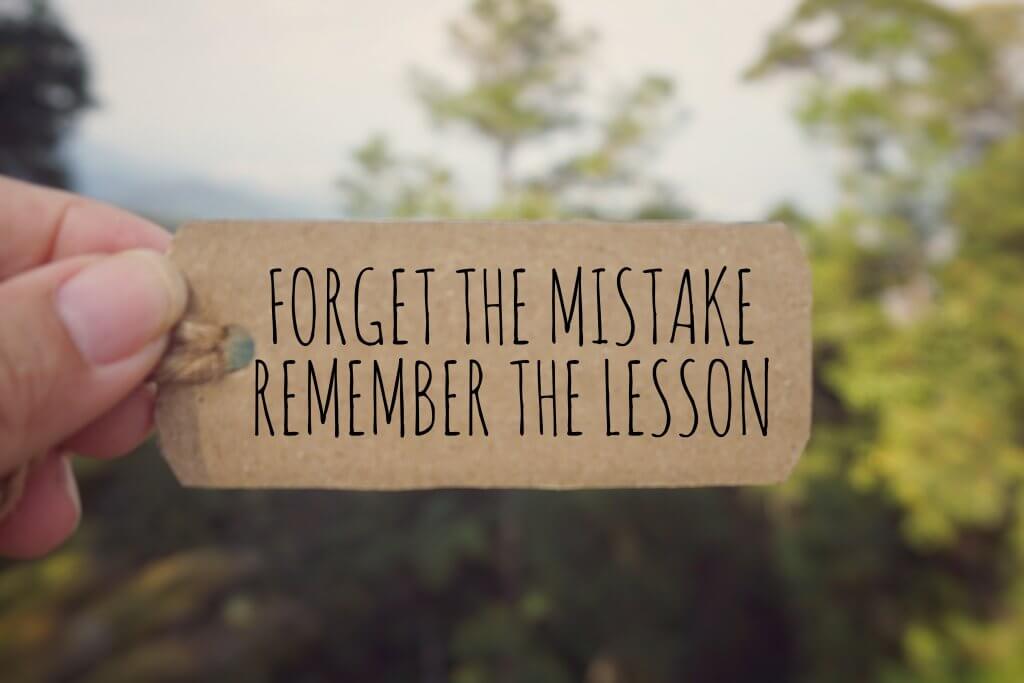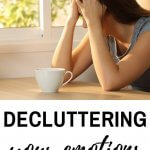Inside: Learn what emotional clutter is, how it’s often tied to physical clutter, and how to let it go.
Emotional clutter isn’t something that’s talked about much. It’s easier to focus on the physical items in our homes that we can see. However, the feelings we hold on to impact every area of our lives so it’s important to talk about emotional clutter.
Emotional clutter can be complex. Every person has unique life experiences. It takes being self-aware to recognize our thoughts and feelings so that we can begin to work through them.
Many of these emotions also express themselves as physical clutter in your home. If you want to change your perspective and improve your life, make a decision to let go of emotional clutter.

8 Types of Emotional Clutter
It’s not bad to feel negative emotions. They are a part of life. We shouldn’t deny or ignore them. But we don’t want to get stuck constantly dwelling on them either.
Here are the most common types of emotional clutter we carry.
1. Fear & anxiety
Fear and anxiety can feel paralyzing. We don’t like feeling uncomfortable, so it’s common to not push boundaries or step outside our comfort zone.
Often, the best things in life are on the other side of your fears.
When we don’t allow ourself to work through our fears and push past them, we get stuck.
When I started this blog, I knew I was going to be shoved outside my comfort zone and I was right! I learned to accept being uncomfortable. I even embrace it. That doesn’t mean I enjoy it, but I know it is the only way I can grow.
Your goals should be important enough to you that they push you to work through some fears. You have to want whatever it is so much that you’re willing to be uncomfortable. Maybe your goal is to have a better relationship. Being honest and transparent can be scary, but the ways you’ll grow are worth it.
When fear turns into physical clutter
Sometimes fear and anxiety show up as physical clutter. Fear is one of the reasons you hang onto clutter. You may worry about wanting the item later or what if you regret getting rid of it. You have to want all the positive outcomes of having a clutter-free home more than your fear of letting go.

2. Guilt & shame
Letting go of the past is hard. Remembering mistakes we’ve made can cause us to feel guilty or carry shame. Neither of these emotions are helpful. They bring us down and make us feel unworthy.
Obsessing over the past doesn’t change anything. It instead ruins the present. Choose to let go of past mistakes and focus on making better decisions.
Don’t put your identity in what you did. You are capable of change.
A different way guilt surfaces is by filling up our schedules. We feel guilty saying no, so instead, we overcommit and try to be everything to everyone. That often ends with burnout.
When guilt turns into physical clutter
The way that guilt becomes physical clutter is when we’ve received gifts that we don’t want. Realize the intention was for the gift to benefit your life. If it isn’t, it is clutter and it’s time to let go. People who love you don’t want you holding on to gifts out of guilt.
3. Anger & bitterness
Anger can be a tough one. Often the reason we are upset is justifiable but choosing to carry the anger even if it for good cause ends up hurting us more in the end.
Life is too short to choose to be angry and bitter. Your life will instantly improve when you decide to let it go.
This isn’t about whether or not the person you feel angry and bitter towards deserves it.
This is about letting go of emotional clutter so that you can be the healthiest and happiest version of you.

4. Regret
Regret shares some similarities with guilt and shame. It is often related to choosing to not let go of past choices. We regret that we failed at something or we regret that we never tried. We wish we’d done things differently.
In some cases, you may able to change things. Maybe the opportunity to try something or make amends is still there. But if it isn’t, still choose to let it go.
Carrying regret only weighs you down. Learn from the past and move forward is the best thing you can do.
When regret turns into physical clutter
Regret can show up as physical clutter when you’re holding on to expensive items you aren’t using because you’d spent so much money on them.
Perhaps you thought you’d use it. It seemed like it would improve your life, but it didn’t. Then you have a hard time letting it go because of the money you spent. Here’s the thing though. The money is already gone regardless.
Don’t continue to remind yourself of unfortunate choices you made by holding onto a physical reminder of it.
Choose to forget the mistake and learn the lesson. Don’t hold on to regret.

5. Denial
Denial can be a challenging emotion to declutter because you have to see it work through it and denial itself is about pretending it’s not happening.
It can be hard to accept life as it is. Living in denial may be a coping mechanism to make things feel a bit easier. But you can’t work on what you won’t acknowledge.
If you choose to go through life pointing fingers at other people with a victim mentality, you’ll never be happy. You’ll feel powerless.
The best thing you can do is see the role you play in your life and choose to change you since you can’t change anyone else.
Don’t be in denial about your circumstances or limitations. We all only get 24 hours in a day. Accept reality.
When denial turns into physical clutter
Denial can have manifest itself as physical clutter when we keep items from our past that have no meaning in our current life. We keep clothes that haven’t fit since before having kids. Maybe we keep furniture for when we get the bigger house.
We hold onto items for a life we wish we had, not the life we are actually living.
Accept the season of life that you’re in. Recognize and take responsibility for your actions. Don’t live in a state of denial.

6. Sadness
Decluttering sadness can be hard. Really hard. When difficult things happen in life, it is not so easy to just let go. There is a time for grieving and not everything sad is something we can just move past.
Some sadness may always be there when you’ve lost a loved one. You can’t simply get over it. Sometimes the only thing you can do is take the next little step and that’s ok.
Working through your thoughts and feelings with a trusted friend or counselor can be very beneficial.
In other cases, sadness can relate to not letting go of the past. We can be sad about missed opportunities or broken relationships. We hold onto hurt and sadness and can’t seem to release it.
When sadness turns into physical clutter
Sadness can be a reason we hang onto things. Maybe someone who was important in your life passed away. You might be hanging onto their things because you have a sentimental attachment and it’s hard to let go.
Keep in mind that no person is their stuff. The memories you shared with that person will live on. You don’t have to keep their belongings to remember them well.
In extreme cases where sadness has turned into depression, clutter often shows up too. Studies have found a link between depression and clutter.

7. Discouragement & self-doubt
Life happens. Sometimes things don’t go the way we hoped or planned. It’s easy to feel discouraged and to start to believe things about ourselves that aren’t true.
Don’t compare yourself with others. Social media can breed discontent and jealousy. Call out the lies that go through your head. Replace them with the truth.
You are worthy. You are good enough.
We are limited by our thoughts. If we doubt ourselves and think small, we will live small. Don’t let limiting beliefs run your life.
Allow yourself to dream big. Believe that you can accomplish great things.
8. Overwhelm & indecision
Overwhelm, like fear, has a way of stopping us in our tracks. For many people, the reaction to feeling overwhelmed is to do nothing. It keeps you from making progress or taking action.
When you’re overwhelmed you may also feel indecisive. Stress does not help us make choices. At least not good ones.
You may be generally overwhelmed with your life because your schedule is too busy. When we lack margin and run from one thing to the next it can feel overwhelming. To combat overwhelm, protect your schedule.
When overwhelm turns into physical clutter
Physical clutter accumulates when we are too overwhelmed to deal with it so we shut down. To combat that, create a plan and take small steps. If you’re struggling with being decisive, start with making small decisions and work your way up to bigger ones.

Letting go of emotional clutter:
The following five steps will help you work through your emotional clutter.
1. Identify the emotion
The first step in emotional decluttering is to recognize the emotion for what it is. You can’t deal with things you refuse to see. Be honest with yourself about what you’re feeling and why.
We live in a world full of distractions that can keep us from dealing with the important things in life. Don’t ignore your feelings.
2. Notice the triggers
Notice what causes you to feel the emotion that you’ve identified. If watching the news makes you feel sad, anxious, or overwhelmed note that. If self-doubt is a common feeling for you after scrolling through social media be aware of that.
Don’t compare yourself to others as you work through this. Social media gives us an inaccurate picture of other people’s lives. Don’t try to measure up to what isn’t even real.
Increase your awareness of the impact the people and things in your life have on you. You may need to set some boundaries to protect your mind and heart.
3. Set goals
Setting new goals can be very helpful when you’re working through emotional clutter. Know who you want to be and what you want to work towards.
Stay focused on your goals. Resist the urge to compare to what others are doing and instead choose to be the healthiest version of you that you can.
Don’t get in your own way. When you let go of the negativity you free up space for better things in your life.

4. Get support
Finding help and support is an important part of working through emotional clutter. In cases where you’ve been carrying these emotions for years, it may be wise to seek professional help.
Have friends or family in your life that are supportive. It’s helpful to have people you love and trust in your corner to help you work through difficult patterns and emotions.
5. Create new habits
Choose to no longer dwell on your negative emotions. Don’t give into self-destructive patterns or behaviors. Decide instead to form new habits. Focus on gratitude to change your perspective.
Not every day is supposed to be sunshine and roses and that’s ok. We can and should be honest about that. When you bottle up those feelings, you create emotional clutter.
When those feelings come, do something that is life-giving to you. Read a book, journal, talk to a friend, or exercise. Practice self-care and deal with your emotions in a healthy way.
Working through emotional clutter
Emotional clutter can be more challenging to deal with than physical clutter. It is unseen and often ignored. It takes work to process feelings especially if you’ve been carrying them around for a long time. But as you work through those emotions, you’ll feel lighter.
Keep taking one step at a time to get to a healthier place where you’re free from baggage. Choose a better life for yourself by letting go of the past.
Today can be the start of a new you. Let go of your emotional clutter and get a fresh start.
Want to keep up to date on the latest Simplicity Habit information? Sign up below and also receive the free 8 Quick Decluttering Wins checklist!



I love this post! Such a great reminder that simple living isn’t just about making our space look perfect, but it is about living life to the fullest!
Thanks, Kassy. I appreciate your comment 🙂
Your post is so so precious! I was dealing with Emotional cluter without knowing it. I plan to share this with as many people as I can
Thank you so much
Thank you for this post. It is just what I needed right now. I have an issue going on in my life that I didn’t realize was related to emotional clutter. Now that I can name it, I can move forward.
This is the first time I have seen an article on decluttering with emotion being the central point. This is a very overlooked issue that stems many of the physical correlations of clutter (stress, triggers, exhaustion, overwhelm, etc.). I have been struggling with clutter for many years, but it is so easy to backslide when life sends new stress or old triggers into your life.
Clearing the emotion clutter is first and foremost before (and during) working on the physical clutter. This article has made me reflect on why I keep hitting a proverbial wall with my efforts and never get to my ultimate goal of “enough”.
Thank you for posting this and I hope you do more in-depth articles on this topic.